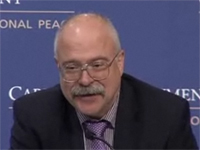Registration
You will receive an email confirming your registration.
The past year has seen what has been called a reset in U.S.-Russian relations. Until mid-September, some very senior Russians perceived this reset as more rhetoric than reality. They also had not expected Barack Obama to win the American presidential elections until rather late in the campaign and feared a new Democratic administration would bring a return to Clinton-era policies which Russia viewed as patronizing. The scrapping of missile defense shield in Central and Eastern Europe, however, pleasantly surprised the Kremlin and has been taken as the first concrete result of the reset.
In a discussion at Carnegie with Ambassador James Collins, the Carnegie Moscow Center’s Dmitri Trenin outlines major global issues where the partnership between the United States and Russia is and will remain crucial:
- Iran: Obama’s missile defense decision in Europe led to a subtle and yet palpable change in Russia’s diplomatic tactic over Iran. Neither Russia’s interests, nor its basic approach have changed, but Moscow has concluded that they can do business with the Obama administration. The potential for a closer diplomatic alignment within the UN Security Council creates opportunities for a more effective approach toward Iran.
- Georgia: The United States and Russia have de facto agreed to disagree on Georgia. Although this does not resolve the long-term issue of Abkhazia and South Ossetia’s status or Russia’s presence in those regions, tensions between the United States and Russia over Georgia are now less likely to impede negotiations on other matters.
- Ukraine: Despite attempts by Russia to encourage a pro-Russian Ukrainian government during the contested elections in 2004, Ukraine will continue moving toward a closer alignment with the West. While Ukraine joining NATO is no longer likely, its accession to the EU is still a long-term possibility.
- START: Although there are substantial technical issues that still need to be resolved, negotiations on a new nuclear arms reduction treaty will likely be successful.
- Missile Defense: There are still questions about a new configuration of missile defense systems, but none of them concern Russia as much as the previous plan did. But this benign attitude may change, as work on a global missile defense system continues and fuels Russia’s worries that the United States might acquire first strike capability against Russia.
Trenin asserted that “the Russians have placed themselves in a difficult situation when they know they are inferior to the United States in many ways, but they won’t accept a relationship which is anything less than an equal relationship. A way out of that situation lies along the path of looking at the strategic basis for U.S.-Russian relations.… If the U.S. and Russia find a way to collaborate on strategic defense issues, then it is no longer MAD [Mutual Assured Destruction]; it is something else. That to me is the one big hope for the relationship. And I think that the window of opportunity is now, essentially it’s lifetime of this administration.”
